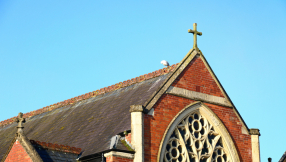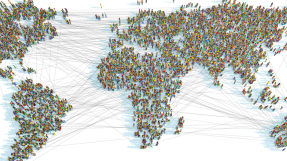The world's media will be taking a great interest in Scotland in 2014. Will we vote to become 'independent' or are we 'better together' in the United Kingdom? Like most political issues there is no uniform Christian answer to this – my own congregation has a former leader of the Scottish National Party and several staunch Conservatives!
But one question is of great interest: if Scotland were to become independent then should our new constitution specifically be a secular one, ignoring any connection between Christianity and the State? If Scotland stays in the United Kingdom, a Kingdom united on the basis of Christianity, should we be rejoicing as the tide of secularism pushes the last vestiges of that public Christianity into the background?
Secularism is a good thing. It must be. Everyone decent says so. And look at the alternative. Do we really want a religious state run by a Presbyterian theocratic Taleban or a priestly Catholic mafia? Everyone knows that religion is the primary cause of wars, child abuse, bad schooling, sexual repression and Scottish dourness.
As the National Secular Society helpfully tells us, "Secularism is a principle that involves two basic propositions. The first is the strict separation of the state from religious institutions. The second is that people of different religions and beliefs are equal before the law." Who would not want that? Society run on the basic principles of justice, equality, fairness and tolerance with the churches being free to run themselves just like knitting clubs or Star Trek societies. This progressive vision sounds like a secular Nirvana.
The trouble is that it is just a Utopian dream, without any backing in historical fact or present day reality. For centuries European liberals have been doing their best to bring this secular nirvana into existence. John Gray's stimulating and depressing Black Mass points out how this search for a secular utopia has been even more damaging in the 20th Century, than any previous religious attempt. Nazism and Communism were the logical conclusions of elites who believed in the Enlightenment doctrine of progress and were determined to use whatever means to get humanity there.
Of course the more militant secularists don't want the kind of Bismarkian secular society leading to Nazism, the Russian revolution of 1917 leading to communism, the modern Chinese secular communist/capitalist marriage, nor the type of secular states associated with the Arab dictators. But what is their realistic alternative? Sweden? Andrew Brown's marvellous book Fishing in Utopia shows us that whilst Sweden is not the dysfunctional society of Scandinavian crime fiction, neither is it the liberal paradise so beloved of British and American liberals. It is a deeply conservative country, founded upon Christian principles, governed by a liberal metro-elite. The trouble is that having rejected the roots of their Christian democracy, the Swedes are beginning to see the fruits of that Christianity wither. Who would have believed that this summer we would have had rioting in Utopia?
We want a society based on law. But whose law? Secularists speak as though human rights were obvious and self-evident. That is dangerous unthinking fundamentalism. Words like tolerance, fairness and equality are just words. They need to have some definition and meaning. Who determines the meaning? Who does the defining? The rich and powerful? We already have a society in which the government has told us it has the power and right to redefine marriage. Why can't they redefine whatever they want? There is a danger that we could be sleep walking into a system that is run only by the wealthy, powerful and influential. In the Brave New World of the new Secularism I suspect you will find that some are more equal than others.
Our concern is that humanity has not done too well when it replaces God with the State. So does that mean we are left with the impossible dream of the secular utopia where things can only get better, or the threat of religious theocracy? Not at all. There is another way – a secular society based upon Christian principles. Secular in that the church does not run the government and the government does not run the church. But Christian in that the values of the society are based upon the Word of God and the traditional Christian values of tolerance, equality and education for all. The bottom line is that secular democracies cease to be democracies without the foundation and cement of Christianity.
Secularists do not like being called militant or fundamentalist (neither do Christians!). But until they provide some substance to their vision and stop speaking of those who disagree with them as some kind of backward regressives, they have earned the label. There is no one more fundamentalist than a person who thinks that their beliefs are so self-evidently right, that they have ceased to be beliefs and are just facts. It would benefit the countries of the United Kingdom if the secular elites learned to question their own fundamental beliefs and started to think about what a post secular United (or dis-united) Kingdom would really look like.
David Robertson is director of the Solas Centre for Public Christianity in Dundee













